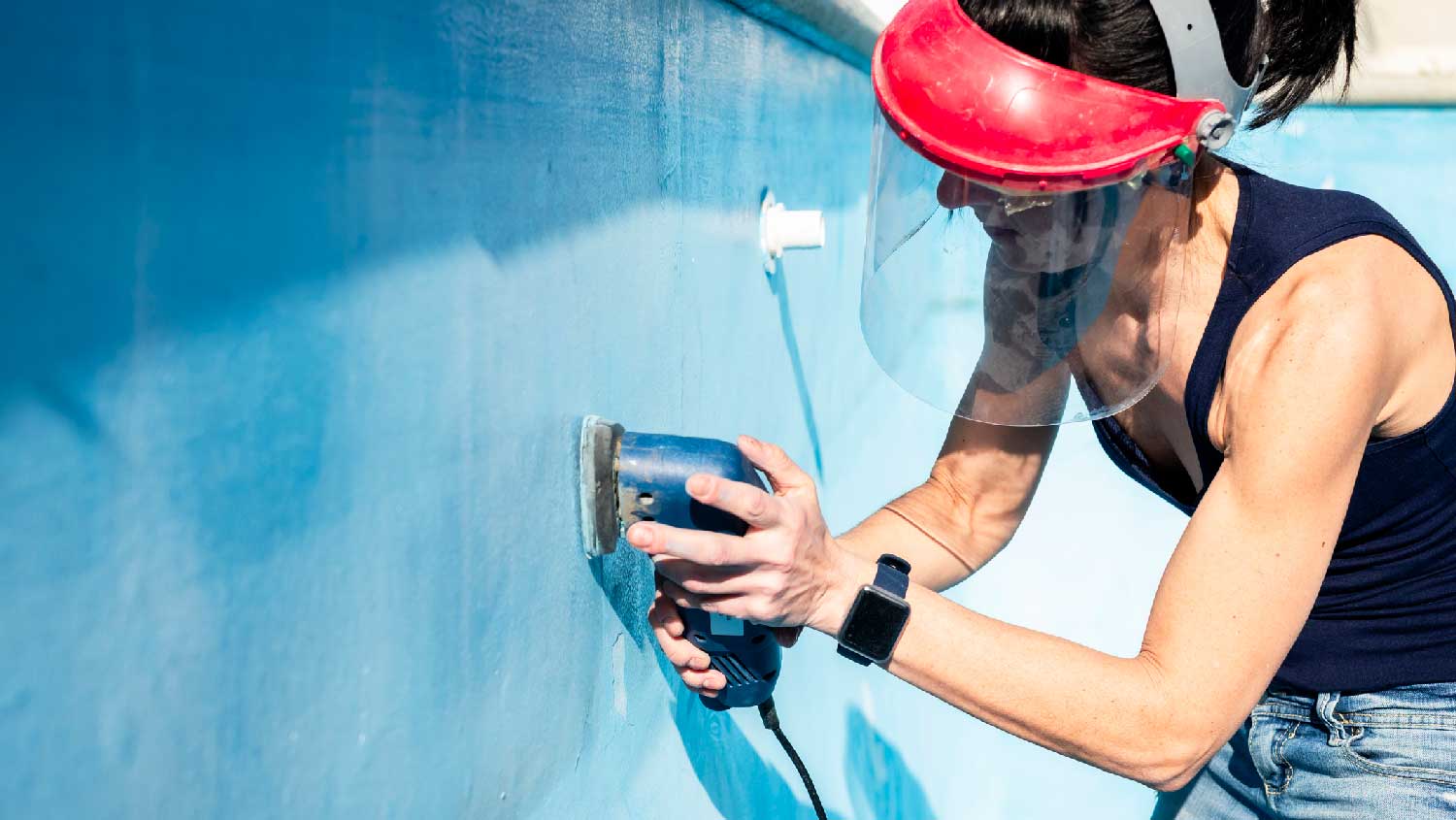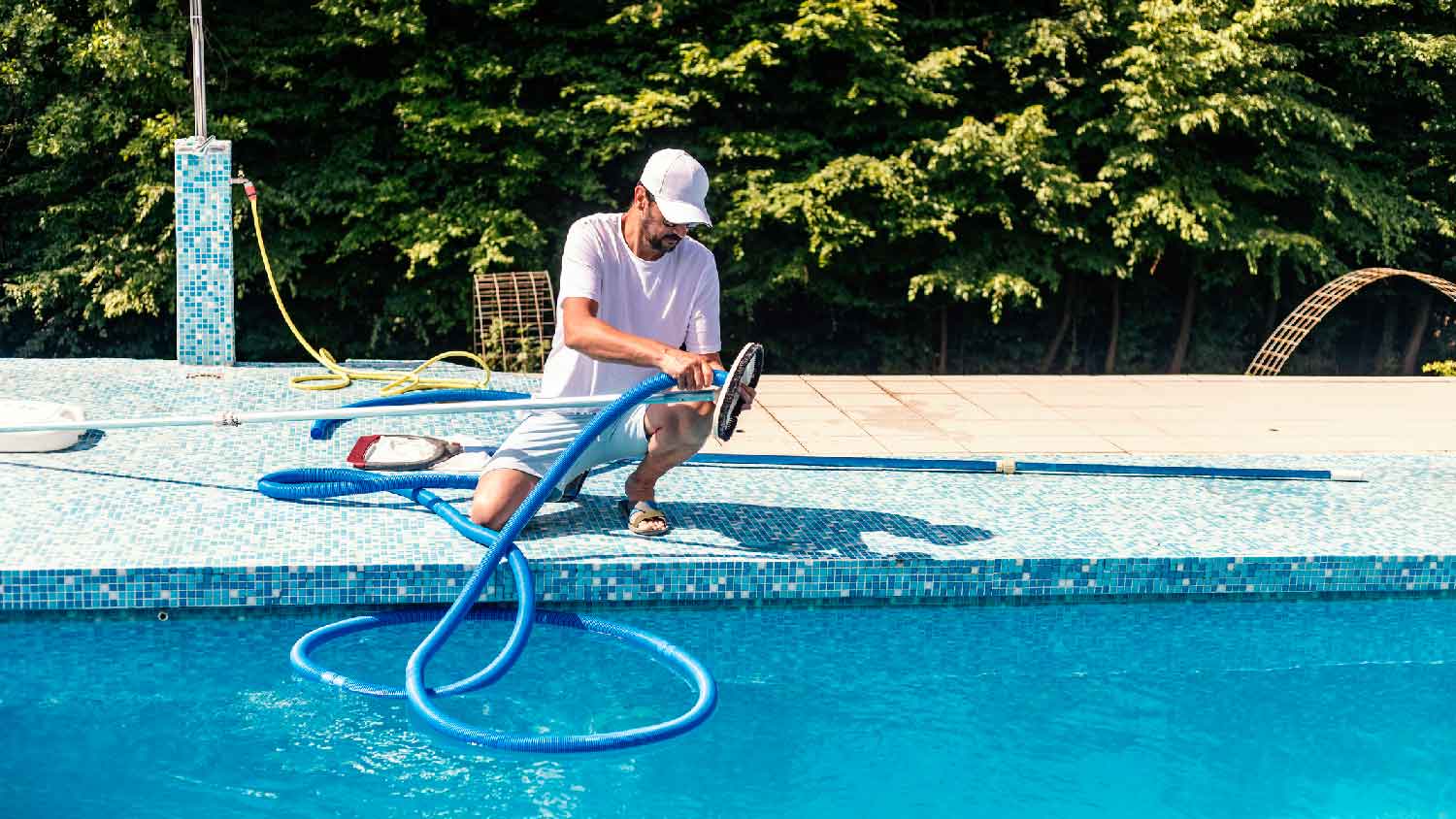
Removing a pool is a labor-intensive job, but the investment can be worth it. Use this pool removal cost guide to estimate how much you’ll pay for the service.
If your pool water is hard to handle, it’s time to soften the situation


Hiring a pro for pool maintenance tasks, such as lowering calcium hardness costs between $116 and $355 on average.
Managing pool chemicals without proper knowledge can lead to overcorrection, equipment damage, or unsafe swimming conditions.
A pool pro brings testing equipment and chemical expertise to safely balance your water—and they’ll get it right the first time.
Investing in local pool services can save you time, guesswork, and the cost of fixing DIY mistakes.
If you're a pool owner, you already know that your backyard oasis requires the perfect balance of chlorine, pH, and alkaline levels to stay clear and comfortable. When numbers tip and dip, taking a dip without worries becomes impossible because you're stuck with calcium hardness. Luckily, you don't need a chemistry degree to achieve perfect calcium hardness in your pool. This guide to how to lower calcium hardness in a pool does the deep dive for you.
Calcium hardness is the measure of your pool water's "softness" or "hardness." When measuring calcium hardness, you're looking at how much calcium has dissolved in your pool's water. The ideal range for calcium hardness is 200 to 400 parts per million (ppm).
The best practice is to test your pool water's calcium hardness at least once a month. Ideally, you will catch increases in hardness before your pool is damaged by hard water. The first sign of high calcium hardness is a cloudy appearance in your water.
Next, you will notice crusty scale deposits on surfaces in your pool. Finally, pool piping, equipment, and surfaces may become rusty once hard water begins to corrode your pool. If you've been putting off a water softener repair cost, averaging between $200 and $1,000, your formerly balanced pool may be sliding out of the normal range.
Start by giving your pool a thorough cleaning. This should include brushing the walls, vacuuming your pool, and backwashing the filter to clear it of any contaminants. A good cleaning can be as effective as other types of water purification because it addresses external factors that affect even treated water. You should also make sure that your water's alkalinity and pH are in the correct ranges. A pool's pH should be between 7 and 7.6. Alkalinity should be between 80 ppm and 120 ppm.

The steps to lower and raise calcium hardness in a pool are fairly straightforward. However, you should consult your pool manufacturer for specific advice based on whether you have a fiberglass, vinyl, or concrete pool. Here's a look at the steps you can try to raise or lower the calcium levels in your pool quickly.
Softer water makes for smoother swimming. Here are three of the best ways to lower calcium hardness in pools.
One easy tip to try is the "drain and replace" method. Simply partially drain some of the water in your pool. Next, refill your pool to the correct level using fresh water. This tip only works in areas where local tap water is not hard water or if your home has a water softener.
Pool flocculant is a commonly used chemical that helps to lift small particles from pool water. Store-bought pool flocculants work by clumping floating particles together to make them easier to lift from the water. While flocculants are effective for removing dirt, debris, and bacteria from pools, they can also bind calcium sediment together to make it easy to lift calcium deposits from your pool.
Once you've used flocculant to get calcium deposits in your pool to clump, you can use a sand filter to remove excess calcium from the water. To do this most effectively, calculate the amount of sand needed for optimal filtration. If you've brushed your pool walls before treating your pool, the calcium deposits that were clinging to the sides of your pool should now be easy to filter out.
Pool owners should be aware of the fact that flocculant is harmful to filters. Always turn your pump and filter off before using flocculant in your pool. Pools with cartridge-style filters typically aren't compatible with flocculants.
Dry acid for treating pools can be sold under the labels of hydrochloric acid, muriatic acid, or spirits of salt. This colorless solution can help bring a pool's chemical composition back into balance. However, acid treatment is considered a last resort because it requires pool owners to handle chemicals.
If you’ve tried other methods and haven’t been able to lower your pool’s calcium levels and aren’t comfortable using chemicals on your own, you can call a pro to do it for you.
While too much calcium can cause scale buildup, too little can be just as problematic. Low calcium levels can create corrosive water that eats away at pool surfaces, etches plaster, weakens grout, and damages metal components. Fortunately, raising calcium levels is easier than lowering them. If your pool’s calcium hardness levels fall below the recommended 200 to 400 ppm range, here’s how to bring them back up:
The easiest, most effective way to raise calcium hardness is by adding calcium chloride to the pool. Follow the manufacturer’s instructions carefully. Most recommend dissolving calcium chloride in a bucket of water before slowly pouring it around the perimeter of the pool water.
If the water you use to fill your pool is soft, or naturally low in calcium, consider using a different water source that has a higher mineral content when you top off your pool. This will help stabilize calcium levels.
Frequent or heavy rain can dilute pool water and lower calcium levels. Keep an eye on pool chemistry after storms and adjust your pool water hardness as needed. To prevent dilution, use a pool cover when you expect it to rain.
Regularly monitoring and adjusting your pool’s pH levels and alkalinity will prevent calcium depletion and help the water stay balanced.


Staying in tune with your pool is the best way to avoid runaway calcium hardness. Fortunately, all of the basic steps that keep pools safe and healthy also help keep calcium hardness in check. Your checklist for preventing damage from hard water in your pool includes these tips:
Routinely cleaning your pool
Looking for clumps or buildup
Carefully monitoring pool chemistry
Testing water hardness at least once a month using strips or a test kit
Finally, get in the habit of addressing problems early. Hard water isn't usually a big problem—as long as you can detect problematic calcium levels before rust and corrosion begin. Take action as soon as you see numbers shifting toward the upper limit of the "good" range. If you're overwhelmed by the task of cleaning and testing your pool regularly, consider hiring a pool maintenance company to manage your pool's cleanliness and chemistry for you.
Common signs of chemical issues in pools include cloudy water, algae growth, irritation after swimming, and a strong chlorine odor. If you experience any of these, talk to a pool contractor.
Learning how to reduce calcium hardness in a pool is something that most pool owners can tackle. However, you may be unsure when it comes to handling pool chemicals. Local pool services can offer ongoing or emergency calcium hardness management.
From average costs to expert advice, get all the answers you need to get your job done.

Removing a pool is a labor-intensive job, but the investment can be worth it. Use this pool removal cost guide to estimate how much you’ll pay for the service.

Discover how much pool maintenance costs, including average prices, cost factors, and expert tips to help you budget and keep your pool sparkling all season.

Knowing you have a pool leak is one thing, but finding it is another. We'll cover pool leak detection costs and what to expect from the repair bill.

Your pool losing water could cost you money if it’s due to a leak. Keep reading to find out why your pool’s water level keeps dropping and what you can do.

Not sure what type of pool would suit your yard best? Use this guide on the different styles and designs to maximize appeal and utility.

The type of pool finish you choose is the best way to both show off your personal style and protect your pool in the long run. Let's walk through your options for pool finishes.